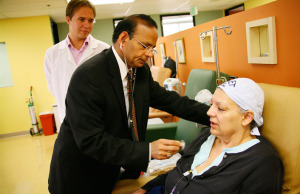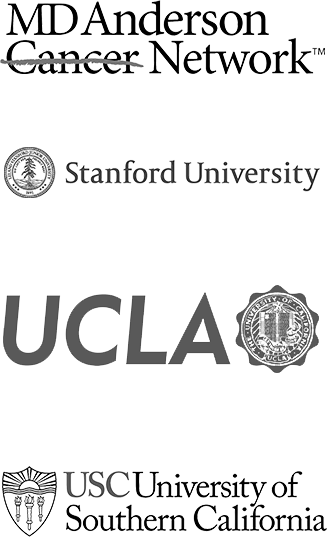Chemotherapy
Chemotherapy is a cancer treatment that travels through the bloodstream and body systems to reach cancer cells, killing them and controlling their growth while also relieving pain symptoms. Chemotherapy may involve one drug or a combination of two or more drugs depending on the type of cancer and its rate of progression. Chemotherapy can be used in combination with other treatments such as surgery or radiation to make sure all cancer cells have been eliminated.
 Chemotherapy Overview
Chemotherapy Overview
Chemotherapy can be administered in one of three ways:
- Intravenous (IV) – considered the most common method of administering chemotherapy drugs
- Oral chemotherapy – pill or liquid form of drugs are taken by mouth
- Injections – type and location of cancer determine where to inject, it can be in the muscle, under the skin, or directly into a cancer lesion
Chemotherapy is an art and science to arrive at the right combination of treatments that will aggressively eliminate cancer and prevent its recurrence while maintaining a patient’s quality of life. Reaction to chemotherapy treatment varies from patient to patient depending on the type of chemotherapy drugs used. Modern medicine has made many advances with therapies that help patients cope with side effects.
Dr. Chawla and the oncology team at Cancer Center of Southern California have pioneered new chemotherapy treatments that have reduced or even eliminated side effects. These new treatments have substantially helped patients by reducing infections and the need for blood transfusions and by protecting the heart and kidney. Most patients do not suffer from nausea and vomiting as reaction to these new drugs.
CTX Treatment for Recurrence
Chemotherapy can be used as an adjuvant (additional) therapy either before or after surgery to prevent a tumor from spreading to healthy tissue. Doctors can only estimate whether a patient’s tumor can metastasize based on the size and appearance of a tumor under the microscope.
Doctors often use chemotherapy for patients with large, fast-growing tumors, which helps to reduce the size of the primary tumor. Shrinking the size of the tumor helps the surgeon to perform a less radical operation. Preoperative chemotherapy could also contribute to better chances of survival. Critical to the success of this strategy is the involvement of a coordinated team of doctors and nurses, which is the strategy used by the Cancer Center of Southern California.

Experimental Therapies
Dr. Chawla has over 30 years of medical and clinical research experience as a leader in experiential treatments and clinical trial drugs. His efforts have resulted in breakthroughs in experiential therapies, including Long Term Interferon Treatment, Therapeutic Tumor Vaccines, Immunotherapy Targeted Therapy, PDL1 and PD1 Inhibitors, and Hyperthermia Therapy for Cancers. Dr. Chawla has access to some of these new advanced therapies, and depending on the case, provides them to his patients. In fact, the Cancer Center currently offers Hyperthermia therapy as a treatment option.
Dr. Chawla’s medical research will continue its focus on development of vaccines, immunotherapies (treatments that use the body’s own defenses to combat cancer) and anti-angiogenic agents (drugs to block development of blood vessels and starve the tumor) to treat cancers. Contact the Cancer Center of Southern California for more information about these revolutionary treatments.
For more information about chemotherapy, visit WebMD.com.
Contact the Cancer Center Specialists Today
Los Angeles’s Cancer Center of Southern California offers patients the best possible solution while respecting the physical and emotional health of each patient. The Cancer Center believes the most effective treatment plan and best possible outcome happen when patients are involved in their care.
Call us today at 310-552-9999 for a consultation with one of our Los Angeles oncologists. We would like to talk with you about your case and answer questions that you might have at this time.
Next, learn more about radiation therapy.
Standard Treatment Generally Accepted Systematic Therapy Agents and Regiments
- Combination regimens
- AD (Doxorubicin, Dacarbazine)
- AIM (Doxorubicin, Ifosfamide, Mesna)
- MAID (Mesna, Doxorubicin, Ifosfamide, Dacarbazine)
- Ifosfamide, Epirubicin, Mesna
- Gemcitabine and Docetaxel
- Single agents
- Doxorubicin
- Ifosfamide
- Epirubicin
- Gemcitabine
- Dacarbazine
- Liposomal Doxorubicin



